Startups and small businesses know the struggle—big goals, limited resources, and the need to stay laser-focused. That’s where OKRs (Objectives and Key Results) come in. The right software helps you track progress, align your team, and hit milestones faster. But if you’re just starting out, budgets are tight, and spending hundreds on OKR software isn’t always an option.
The good news? There are powerful free tools that can give your team structure and alignment without draining your funds. Here are 10 of the best free OKR platforms to try in 2025.
Table of contents
- Free vs Paid OKR Software
- 10 Free OKR Software Platforms Teams Love
- 1. OKRs Tool – Built for Startups
- 2. SimpleOKR – No-Frills Goal Management
- 3. Synergita – OKRs + People Management
- 4. Effy – AI + OKR Feedback Loops
- 5. SugarOKR – Free and Simple
- 6. Tability – OKRs + Weekly Check-ins
- 7. Weekdone – Structure for Small Teams
- 8. Perdoo – Strategy Meets OKRs
- 9. Primalogik – Balanced Goals and Reviews
- 10. Allo – Collaborative OKRs with Visibility
- Final Thoughts
Free vs Paid OKR Software
Free OKR software is often more than enough for small teams and early-stage startups. You’ll typically get essentials like creating objectives, tracking key results, and running check-ins.
This helps you build the habit of structured goal-setting without overcomplicating things. Paid plans, however, unlock advanced features like integrations, reporting, performance reviews, and scalability for larger organizations.
The key is to start free, learn what your team needs most, and then decide if upgrading is worth it. For many teams, free versions can support growth far longer than expected.
10 Free OKR Software Platforms Teams Love
1. OKRs Tool – Built for Startups
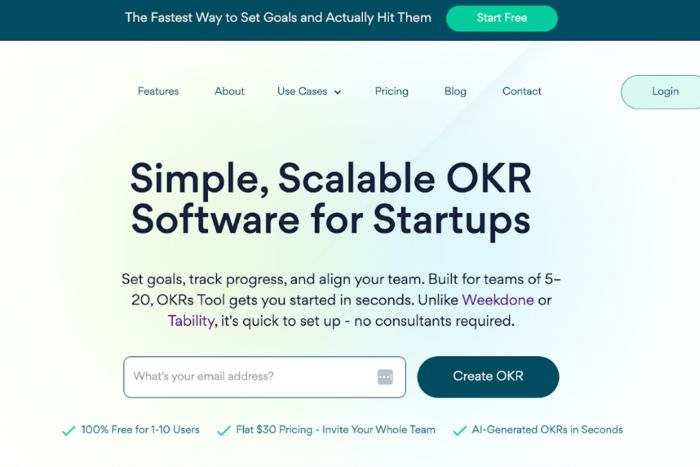
OKRs Tool focuses on clarity and speed for fast-moving teams.
You can create company, team, and individual objectives in minutes, run lightweight weekly check-ins, and view progress on clean, no-nonsense dashboards that keep priorities front and center.
The free plan is a practical on-ramp for early teams that want structure without process bloat or long onboarding. Slack updates help keep goals visible in the flow of work, which reduces meetings and status chasing.
Teams gravitate to OKRs Tool because it’s easy to adopt, scales as the team grows, and stays laser-focused on outcomes instead of features you’ll never use.
2. SimpleOKR – No-Frills Goal Management
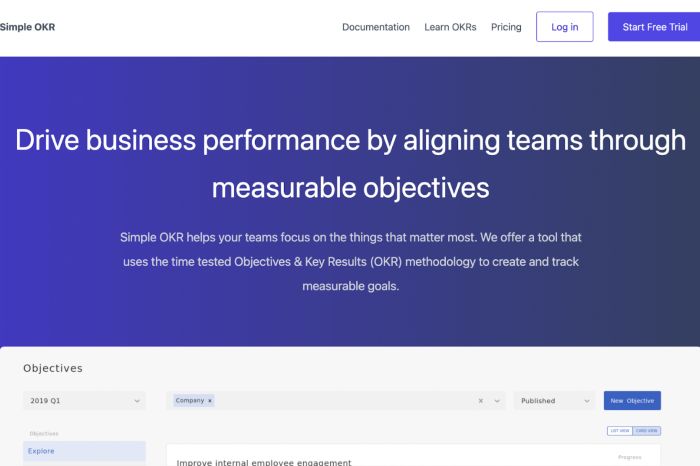
SimpleOKR does exactly what the name promises: it makes OKRs simple.
Set clear objectives, attach measurable key results, assign owners, and track weekly movement without wading through complex configuration. The free version gives small teams everything required to start an OKR rhythm—visibility, accountability, and a shared language for progress.
Because the interface is intentionally minimal, founders can roll it out in an afternoon and avoid the learning curves that slow adoption.
Teams like SimpleOKR for its quiet reliability, quick onboarding, and the way it keeps everyone’s attention on the goals that matter rather than the mechanics of the tool.
3. Synergita – OKRs + People Management
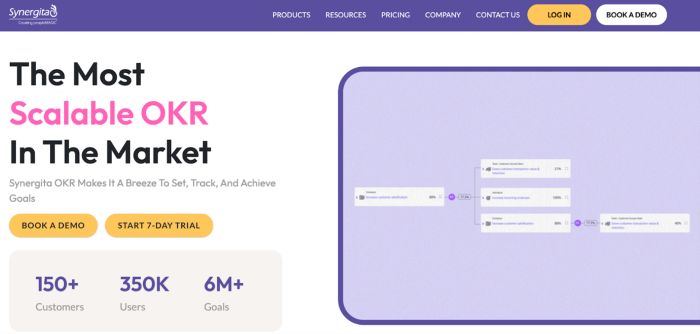
Synergita blends OKR tracking with performance reviews, feedback cycles, and engagement checks so young companies can connect outcomes with the people and behaviors driving them.
On the free tier, startups can pilot shared objectives, assign ownership, and collect lightweight feedback to reinforce alignment. This people-first approach helps teams build accountability and culture while they grow—useful when roles are evolving quickly.
Leaders appreciate having OKRs, recognition, and review touchpoints under one roof, which streamlines conversations and reduces tool sprawl.
Teams like Synergita because it ties goals to development, making progress feel both measurable and human.
4. Effy – AI + OKR Feedback Loops
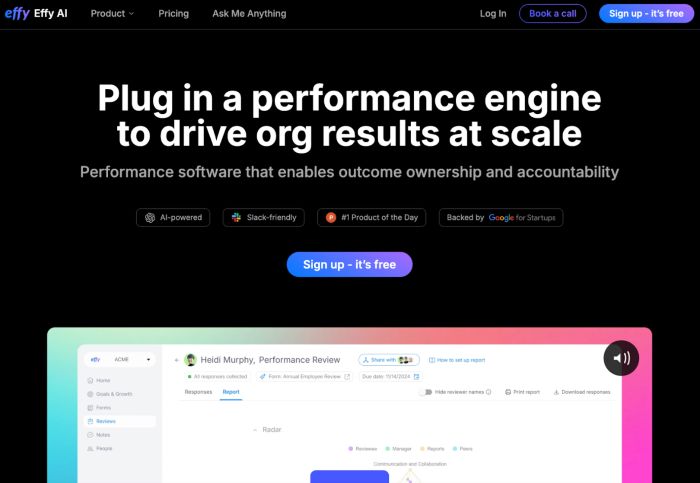
Effy brings automation to goal tracking and feedback, helping small teams establish healthy habits early.
You set objectives and key results, then use built-in prompts to gather 360º input, surface blockers, and nudge timely check-ins—useful when everyone’s multitasking.
The free plan lets startups experience OKRs alongside lightweight performance workflows without committing budget. Managers like how Effy reduces administrative overhead and keeps discussions anchored in outcomes instead of activity.
Teams appreciate the gentle reminders, structured reflections, and clear ownership that make OKRs stick, turning sporadic updates into a steady cadence of learning and improvement throughout the quarter.
5. SugarOKR – Free and Simple
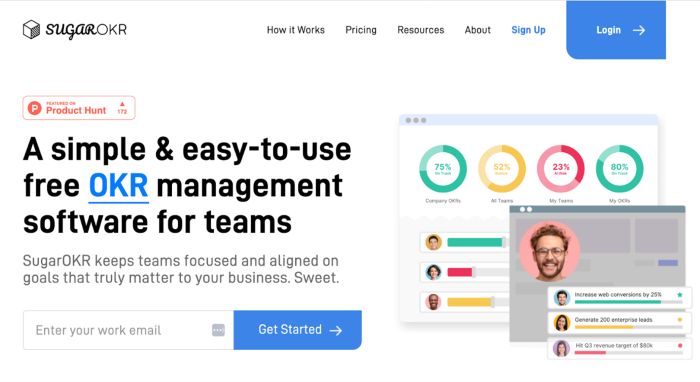
SugarOKR is a clean, distraction-free way to replace spreadsheets with structured OKRs.
Create objectives, link key results, and share progress in a straightforward workspace that emphasizes clarity over customization. Its free option is ideal for seed-stage teams that need visibility without the overhead of heavy reporting or deep integrations.
Because it’s so lightweight, SugarOKR is easy to roll out across functions, giving everyone a single source of truth for priorities.
Teams like SugarOKR for its “just enough” feature set, fast adoption, and the confidence that comes from tracking goals in a purpose-built tool—without adding cost or complexity.
6. Tability – OKRs + Weekly Check-ins
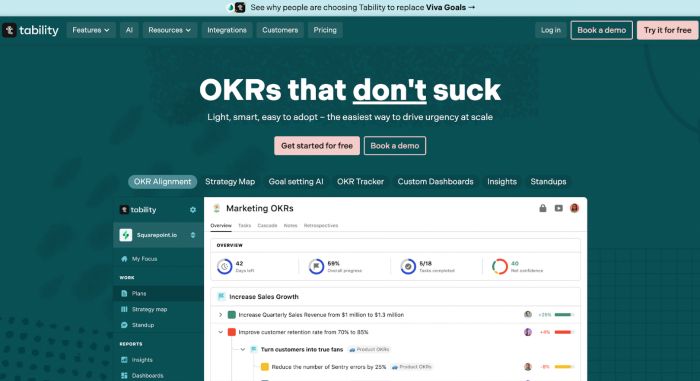
Tability is designed to make check-ins effortless so OKRs don’t fade after kickoff.
The product guides teams through brief updates, confidence ratings, and notes that highlight risks early.
Templates help first-timers write better objectives and measurable results, while visual views make it obvious what’s on track or needs attention. A free plan gives small teams room to practice the weekly rhythm that turns OKRs into a habit.
Marketers and product teams especially like Tability’s gentle prompts and simple summaries—they lower the friction of staying aligned, keep progress visible between meetings, and encourage thoughtful course-corrections mid-cycle.
7. Weekdone – Structure for Small Teams
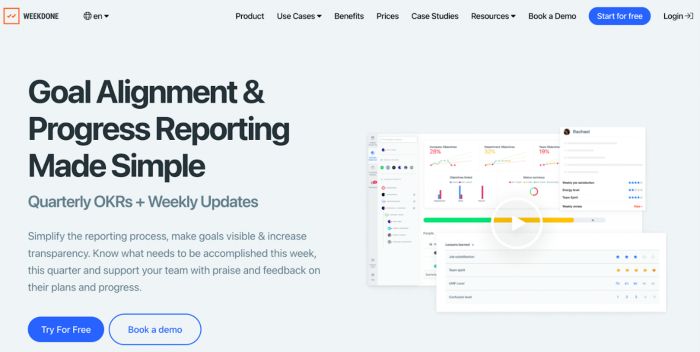
Weekdone pairs OKRs with weekly planning and reflections, teaching teams how to turn aspirations into execution. You’ll define objectives and key results, then map weekly priorities and record learnings so progress compounds.
The free tier suits small groups getting started, offering guided templates and lightweight reports that build discipline without feeling bureaucratic. Leaders value how Weekdone reinforces focus and keeps everyone’s work connected to the bigger picture.
Teams like the balance of structure and flexibility: enough guidance to build consistency, plus approachable check-ins that make it natural to discuss what worked, what didn’t, and what changes next.
8. Perdoo – Strategy Meets OKRs
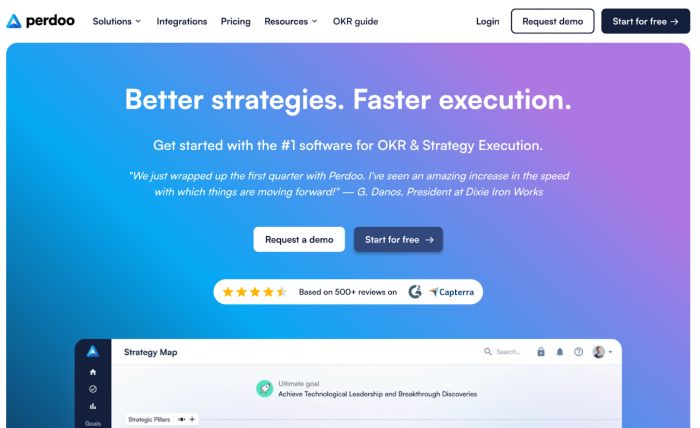
Perdoo helps startups connect long-term direction to quarterly outcomes by combining strategy mapping, OKRs, and KPIs in one place.
Even on a free plan, teams can outline objectives, assign key results, and visualize how efforts ladder up to company priorities. That top-down clarity reduces scattered initiatives and supports cross-functional alignment as headcount grows.
Leaders appreciate Perdoo’s emphasis on context—people see why goals exist, not just what to do.
Teams like the visual goal maps and straightforward status views that make reviews faster and conversations more strategic, so time shifts from reporting to deciding what to change.
9. Primalogik – Balanced Goals and Reviews
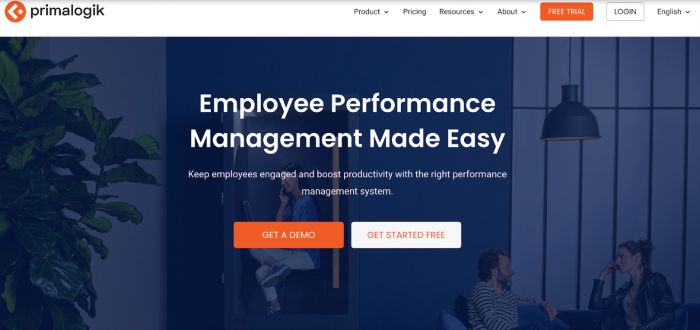
Primalogik brings goals and performance conversations together, helping managers ground feedback in measurable results.
Startups can experiment on the free tier by setting OKRs, running lightweight reviews, and collecting continuous feedback in one workflow.
This linkage encourages better one-on-ones: progress against key results informs coaching, development areas turn into clear next steps, and recognition is tied to outcomes.
Teams like Primalogik because it reduces context switching and keeps performance dialogues practical, not abstract.
For early companies building culture and cadence, it’s a simple way to align expectations and celebrate momentum without adding extra administrative load.
10. Allo – Collaborative OKRs with Visibility
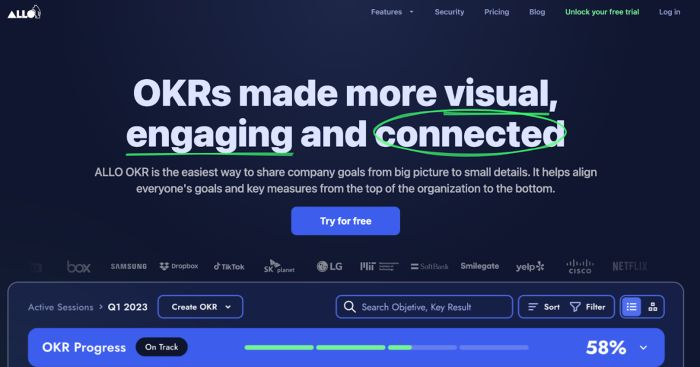
Allo blends OKRs with collaborative planning so strategy and execution live side by side.
Teams set objectives, connect key results to initiatives, and track work on visual boards and timelines—handy for cross-functional launches and campaigns.
The free option lets small groups coordinate goals and day-to-day tasks in one workspace, increasing transparency and reducing status meetings.
Creative and product teams like Allo’s visual approach because it clarifies ownership, reveals blockers early, and makes progress obvious at a glance. By pairing goals with the actual work, Allo helps startups stay aligned without losing momentum to process.
Final Thoughts
Free OKR software is no longer a limited trial—it’s a genuine way for startups and small businesses to stay aligned without spending a penny.
Whether you want the startup-focused simplicity of OKRs Tool, the habit-building check-ins of Weekdone, or the all-in-one people-first approach of Synergita, there’s something for every team.
The real advantage isn’t just saving money. Free OKR tools let you experiment, build alignment habits, and test what works for your team before scaling. As your business grows, you’ll know exactly when—and if—you need to invest in paid plans.
Until then, the best part is this: structure, alignment, and focus don’t have to cost a thing.











